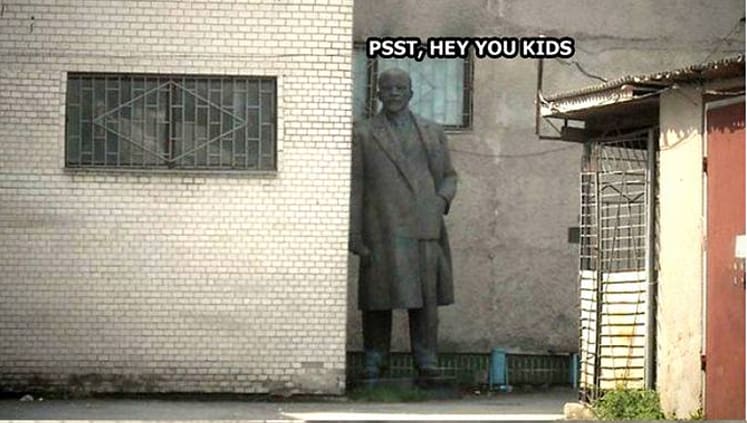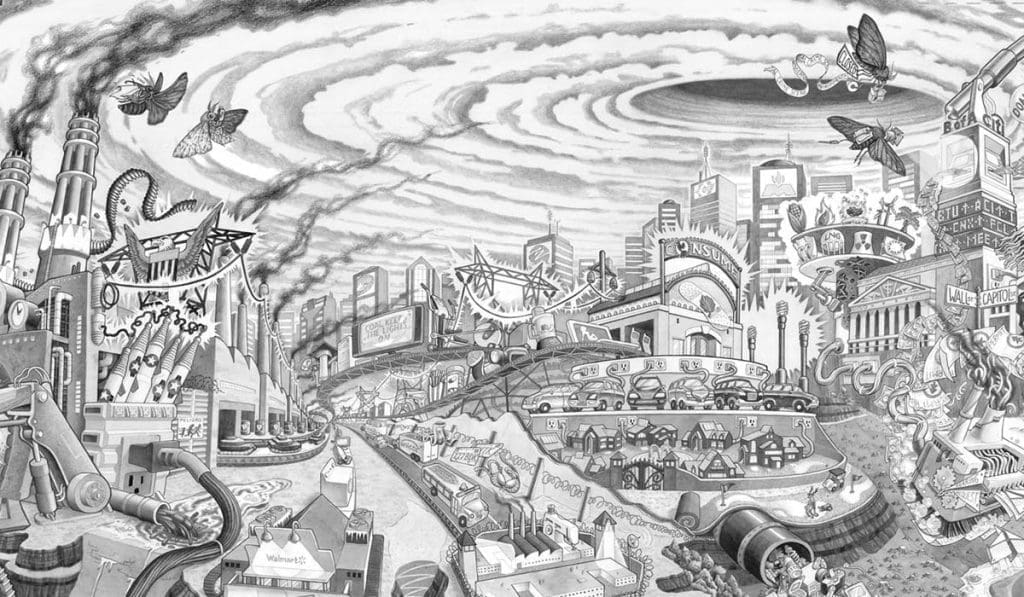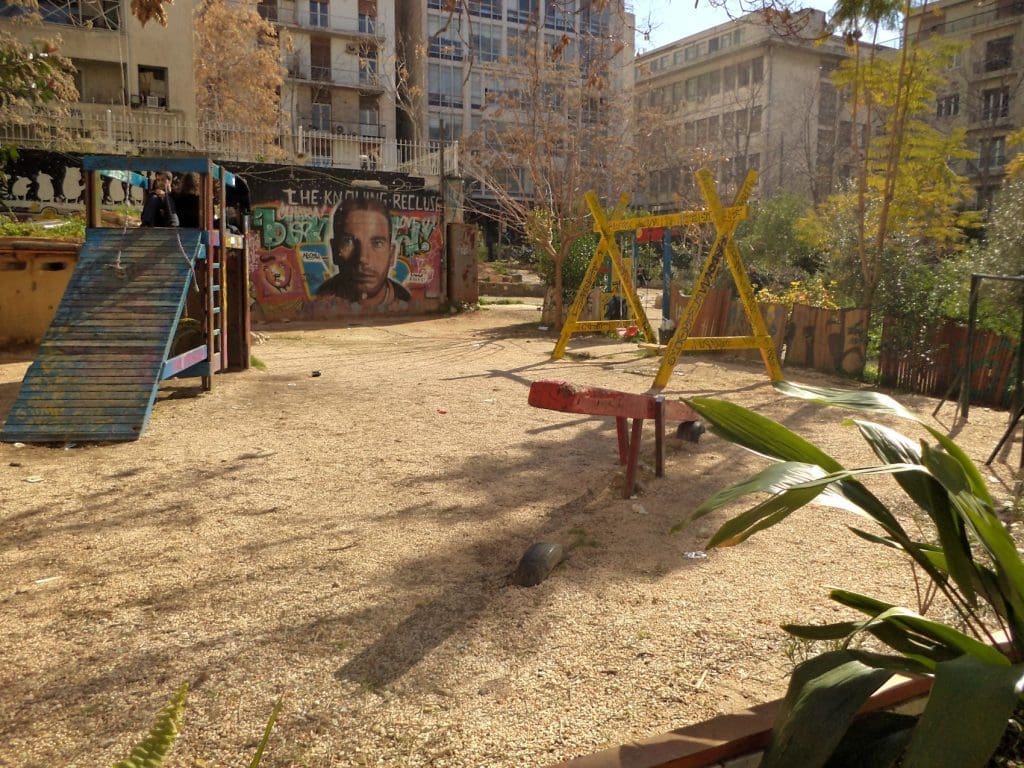Transcribed from the 27 August 2016 episode of This is Hell! Radio (Chicago) and printed with permission. Edited for space and readability. Listen to the whole interview:
These are three different, interesting ways of thinking about movements and power: autonomy, articulation, and absorption. Most of the debate on the left is about which is the right model of politics. But good activists are agnostic (to use another A-word). They don’t have a theory of politics that is used in all places and at all times.
Chuck Mertz: Only the Radical Pessimist would spend his summer visiting a country at war (Ukraine), a nation facing a coup (Armenia), another nation in many wars on many fronts (Lebanon) and one in an economic and refugee crisis (Greece).
Welcome back to This is Hell!, Kevan Harris.
Kevan Harris: Good morning to you.
CM: This summer I went to the same old lake and sat in the same old moldy cabin that I’ve been sitting in every summer for my entire life. You went to Ukraine, Lebanon, Armenia, and Greece. Thank you for traveling around the world for me so you can report back on what the hell is happening.
KH: Yeah! So I was in these seemingly very disparate countries, and I at first thought everything was going to be quite different. But each time I got to the next country and talked to people who had been involved in politics there, I started to realize there were a lot of similarities. I want to talk about some of the interesting patterns I recognized.
I spent several weeks in Ukraine; in Kiev and then in Odessa on the Black Sea. I was giving some lectures at the different universities there. In Ukraine, there were, as many people know, major protests in late 2013 and early 2014, in Kiev and other cities, generally known now as the Euromaidan or the Maidan protests. They were largely grassroots, generally anti-corruption, and against the particular politicians in power then. It devolved into a variety of rightwing groups taking over the protests, and then devolved even more into a separatist war in the east, Russian backing for that war, and then a highly polarized politics where people had to pick a side.
So by the time I got there, walking around Kiev was like being in a war: the country is actively at war. There were posters of the national guard all over the city, and lots of documentation of all the martyrs—they use the term martyrs—who had died in the protests. But also, cynicism was apparent among many young people: they were tired of displaying this overt and official nationalism where if you didn’t like what the government is doing, you were anti-revolution. Many people were ambivalent about what the protest had produced. For many, it had produced something worse than had existed before.
Then I ended up in Lebanon. In Lebanon there were some pretty interesting protests, about a year ago right now, the You Stink protests. In August of 2015 there were lots of protests around the world. In Lebanon, and specifically in Beirut, these were protests against lack of services. The garbage collection in Beirut, like in a lot of places, is done by the private sector, by the state contracting out to private companies—in this case private companies owned by politicians. The companies weren’t being paid, so they stopped picking up the garbage, so garbage started to pile up. And Beirut is an old city, medieval streets; there aren’t alleys everywhere to put your garbage in. Garbage goes out front, like in Manhattan.
And instead of garbage piling up only in the poor parts of town—which happens a lot and nobody in the rich areas notices—this time all of the city was affected, and all of the city started to stink. Think of August in Beirut, with garbage piled all over the place. So there were protests starting in August called You Stink, general anti-corruption protests, not against a single party or group in Lebanese politics, but against all of them, saying basically “get your act together.” The protests lasted several months, including occupations of different squares in Beirut, just as they had done in Ukraine. Eventually there was a stopgap solution; the protesters got at least a minor part of what they wanted, and garbage got picked up.
You can still see the signs today. You can walk around Beirut and see what used to be nice walkways in nice parts of the city where there are deep, nasty, black garbage stains on sidewalks, where a heaping pile of smelly, rotting garbage—we’re talking about piles the size of buildings—had been sitting there for months. They left their mark on the city.
And again, this was only a stopgap solution; these were simmering protests after many years of problems in service provision, and the government is still not doing much. Everybody was telling me they predicted that the garbage contracts would be broken again, and they would have a similar problem. Luckily that didn’t happen while I was there.
In Armenia there were also protests in summer 2015, in this case against electricity hikes. They turned, over time, into protests against the ruling government, a post-Soviet-style government in which everybody is linked to some form of off-the-books oligarchy. And again, the protests ended with the protesters winning a bit; the electricity prices went back down. Still, I don’t know if you heard the news, but there was a minor coup attempt in Armenia riding off the wave of coup enthusiasm in Turkey. It also failed, but it brought people out into the streets.
Then I ended up in Greece, and everybody knows the story there. There was a huge wave of enthusiasm for Syriza, the party that was supposed to say no to Europe, and then its capitulation to the EU, signing onto an agreement harsher than anybody had expected.
Those are four examples of people power that was supposed to be (or people hoped it would be) channeled into political parties or political processes. In some cases they got what they wanted, but they also had higher demands that were unmet. In other cases they got even worse than what they had wanted.
So I was thinking about this. For a long time, I used to come on the show and complain about the fact that movements weren’t being channeled into political parties; then it seemed like some attempts were being made; today (after the Bernie Sanders campaign, for example), we seem to be starting to get disillusioned again. The pendulum is swinging back towards groups staying autonomous from parties, autonomous from institutionalized power. Are we moving back to the old idea that if we touch political power it always means disillusionment and failure, and that we have to stay autonomous from parties? I don’t like going backwards in terms of thinking, and I don’t like repeating arguments that have already been proved wrong in many ways.
Last week I had the chance to talk with a sociologist and journalist named Michael Gould-Wartofsky. He wrote a book last year called The Occupiers; it was a blow-by-blow account of Zucotti Park and the making of the Occupy Movement in New York City. He’s a sociologist documenting the actual political strategies of the organizations and individuals who took part in Occupy, and is now doing the same regarding the Black Lives Matter movement.
He was talking about three different ways in which movements and parties are related. The first is the way that many people used to think about movements: that staying autonomous from political parties is the way that movements have power. You don’t want to link up with political parties. You want to stay autonomous. That’s the first A-word, autonomous. Many anarchists use the word autonomous; it’s used on the left all the time. It’s like a purity. If you touch political parties, you become impure. Your power comes from your separation from these vertical organizations that are linked to the state.
But there’s another A-word, which is the opposite: articulation. This is the idea that political parties are most progressive when they articulate with social movements, meaning when they link up with social movements and they work together. Unions, for example, are often linked to political parties and sometimes they work together to push forward demands. Or we can think about what the Sanders movement was supposed to be: a social movement that linked to or joined up with a political party and pulled it in a particular direction.
Or we could think about what used to be the cause celébre on the left, Venezuela. In Venezuela there was the Chavista party, the socialist party in Venezuela, which linked up to all of these existing civil society movements on the ground that had been around for ten, fifteen, twenty years. This was also a model of articulation; when political parties and social movements link up together, that’s when you get power!
So these are two very different ways of thinking about how popular power gets mobilized and accomplishes things. Then Michael listed a third one. I thought it was quite interesting. He said it was the power of disruption. This is an old idea in American politics; think of Saul Alinsky. Basically, social movements have to disrupt business-as-usual; they have to disrupt the political order or the way that political parties do things, and the best they can hope for is for their energy and their demands to be absorbed—another A, absorption.
Movements come and go; as we all know it’s very hard to sustain a social movement a long way. But they can make a big dent by disrupting the usual way of things. Sometimes that involves protest, sometimes is doesn’t. But the hope is that this energy gets absorbed and pushes politics in a particular direction.
These are three different, very interesting ways of thinking about movements and power. Autonomy, articulation, and absorption. Most of the debate on the left is about which is the right model of politics. The classic one is the third one. American politics is often about upsurges from below that don’t turn into a third party, but are absorbed into the Democratic or the Republican Party.
One of the problems on the left in the United States is that we take United States politics to be a general model of politics around the world. That’s the cool thing about traveling around a bit: you see other ways in which politics and movements interact. Of course, it’s dangerous to take a single theory of politics and then try to apply it elsewhere. Good activists, in my opinion, are agnostic (to use another A-word). They don’t have a theory of politics that is used in all places and at all times. Good activists are strategists. They can read the situation; their gut is good at reading the political landscape. There’s not a single theory that works—this isn’t a philosophical theory of political power. Politics should remain somewhat distant from philosophy. Good activists can read the landscape and see which strategy works at which time, and can also change based on how the landscape shifts, often by the success or failure of the movements that were already taking place.
On the other hand, pivoting based on the way the landscape changes is hard; when you’ve built up a movement and you’ve built up institutions that are linked to movements, it’s hard to unravel them and move them in different directions. Hence all the discussions today about Sanders.
But let’s think about Black Lives Matter. Black Lives Matter has refused to be institutionalized in the Democratic Party. In that sense, it looks like classic American politics, the way we like it: movements that are not linked to the Democratic Party, for whom that very refusal is where they get their power from. They’re easy to romanticize. But they’ve been successful. They’ve refused to be co-opted. Their protests have pushed the Democratic Party in particular directions, at least for the time being, but they haven’t become a tractor of the Democratic Party, pulling out the vote. They’ve stayed autonomous from that. That works in this particular case because of the political process of the election. But will that work after the election? Will that work all over the world? I don’t think so.
Young people should realize that ten years ago there were far fewer social movements around the world. Since 2008-2009 there’s been a huge global upsurge in a whole variety of movements, some nasty, some we like, but hundreds and hundreds of new types of social movements and political movements around the world. The real question for activists and armchair lefties, if they’re interested, is whether instead of trying to impose a theory of politics where there is a right way, we should be a bit more humble and admit we don’t really know what works right now. We’ve seen a lot of different examples.
Look at Greece, or look at Venezuela. What a horrible disillusionment for the left in Venezuela. Most people who celebrated Chávez and celebrated the Venezuelan left turn, the pink turn, still can’t grasp how bad things have gotten there. They’re still blaming US power, Yankee imperialism, and they don’t realize how disastrous the downturn in that country has been, and you cannot blame that on some kind of global conspiracy.
That requires a post mortem. I say post mortem because it seems like it’s over. What went wrong? I don’t see the left—certainly not the left in the United States—having the intellectual courage to dissect it and draw lessons from it (maybe less so in the Greek case). Instead, we’re always looking for the movements on the upsurge.
The crisis going on in the world today isn’t going to stop, and we’re going to see a lot of new movements pop up. The question is: when they do, will we need to fit them into our categories of political theory (“These are the ones linking up to the state, that means they’re either good or bad…”)? Or will we be agnostic, as a good activist should always be, and try to think through the strategies that movements are proposing?
Featured image source: Facebook (anonymous user)





